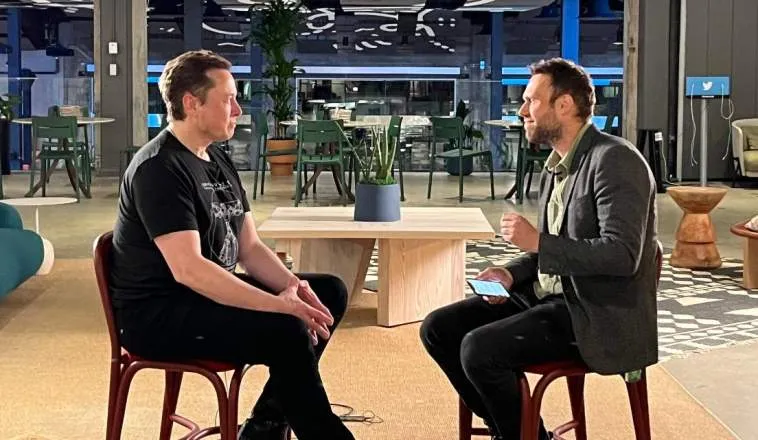(Daily Wire) There’s an old saying that “if you come at the king, then you best not miss.”
That’s a lesson one BBC journalist should have learned before he tried and failed to challenge self-described “Chief Twit” Elon Musk for allegedly allowing “hate speech” to flourish on Twitter since purchasing the site. The journalist couldn’t provide one specific example of hate speech he had seen on Twitter, and Musk took him to task for his unpreparedness in remarkable fashion.
“We’ve spoken to people very recently who were involved in moderation and they just say there are not enough people to police this stuff, particularly around hate speech in the company,” BBC U.S. Tech reporter James Clayton said in an interview released Tuesday night. “Is that something that you want to address?”
Musk was quick to ask for clarification from Clayton.
“What hate speech are you talking about? I mean, you use Twitter,” he asked. “Do you see a rise in hate speech? Just a personal anecdote … I don’t.”
BBC ‘journalism’ at its finest 🤦🏻♂️
BBC Journo: “There’s been a rise in hatful content on Twitter.”@elonmusk: “Give me an example.”
Journo: “I can’t.”
Musk: “You just lied.” pic.twitter.com/wOfzn5vGfJ— Darren Grimes (@darrengrimes_) April 12, 2023
In turn, Clayton insisted that on his For You page — the tab on Twitter which shows users who you don’t follow — that he personally gets “more of that content.” Musk then asked for more specifics, “content you don’t like or …? Describe a hateful thing.”
Clayton could not provide an adequate definition.
“Yeah, you know just, content will solicit a reaction that may include something slightly racist or sexist, those kinds of things,” he said tepidly.
Musk was understandably perplexed as to how “slightly sexist” content could constitute hate speech or be deemed worthy of being banned. Musk again requested that Clayton name one example, but then the journalist admitted that he hadn’t looked at the ForYou tab in nearly a month after some back and forth.
“Well, then how can you say you’ve seen more hateful content?” Musk asked point-blank.
Clayton claimed he could do so because he had been using Twitter since Musk took over.
“So then at some point, you must have seen hateful content,” the Tesla founder said. “I’m asking for one example and you can’t give a single one.” Clayton stammered and Musk said, “I say sir that you don’t know what you are talking about.”
“Really?” the reporter shot back.
“Yes because you cannot give me a single example of hateful content, not even one tweet,” Musk said. “And yet you claimed that hateful content was high … That is false, you just lied.”
In reaction to the interview, Twitter users lit into the BBC.
“One would imagine, if you are going to tackle one of the brightest people on the planet, about a company he has recently bought, that you’d come into the discussion at least semi-prepared,” one Twitter user tweeted. “What a car wreck of an interview.”
One would imagine, if you are going to tackle one of the brightest people on the planet, about a company he has recently bought, that you’d come into the discussion at least semi-prepared. What a car wreck of an interview 🎪
— Mike Abel (@abelmike) April 12, 2023
“This conversation between Elon Musk and a BBC journalist is hilarious,” Konstantin Kisin, host of TRIGGERnometry, said. “Note how quickly these narratives collapse when released into the real world.”
This conversation between Elon Musk and a BBC journalist is hilarious. Note how quickly these narratives collapse when released into the real world. pic.twitter.com/ZnPWUqtZAg
— Konstantin Kisin (@KonstantinKisin) April 12, 2023






